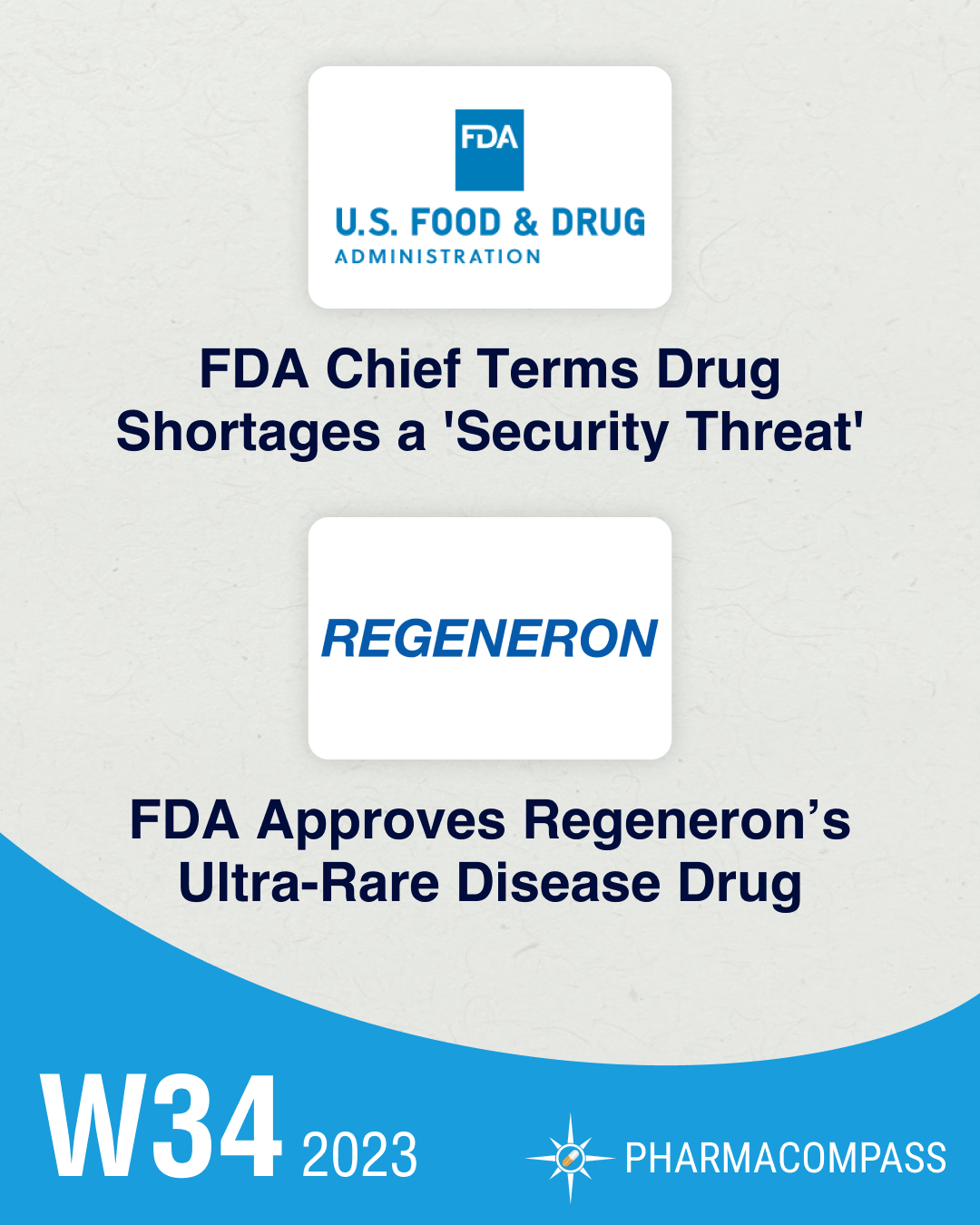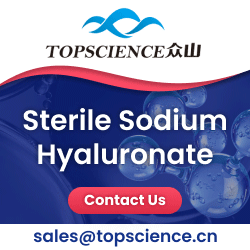
By PharmaCompass
2023-08-24
Impressions: 1,433 (Article) || 1 (Video)
Like last week, this week too saw several drug approvals. The US Food and Drug Administration (FDA) approved Regeneron’s Veopoz for the treatment of CHAPLE disease (CD55-deficient protein-losing enteropathy) in both adults and pediatric patients aged one year and above. The agency also approved the company’s higher dose Eylea for the treatment of wet age-related macular degeneration (wAMD), diabetic macular edema (DME) and diabetic retinopathy (DR). Pfizer’s RSV vaccine also bagged FDA’s nod for use in pregnant women to protect babies.
In news from clinical trials, Merck announced positive results from a late-stage trial of belzutifan in advanced renal cell carcinoma. Eli Lilly’s Retevmo also posted positive results from a late-stage study for the treatment of thyroid cancer.
Novo Nordisk has hired Thermo Fisher as the second contract manufacturer for its immensely popular weight-loss drug Wegovy.
Meanwhile, FDA commissioner Robert Califf has termed drug shortages in the US as a ‘national security threat’ and has cited the low prices of generic drugs as the key reason behind these shortages. And FDA has issued a partial clinical hold on Gilead Sciences’ late-stage clinical trials evaluating magrolimab in acute myeloid leukemia (AML) patients.
FDA chief says drug shortages due to low-priced generics; terms it a ‘security threat’
FDA commissioner Robert Califf has pointed out low generic drug prices in the US as a key contributor to the ongoing drug shortages. Speaking at a webinar hosted by the Alliance for a Stronger FDA, Califf said US drug shortages now constitute a “national security threat”.
Califf said drug shortages aren’t good for society. The “fundamental problem,” according to him, stems from the fact that the US essentially has “two drug industries.” There’s the “innovator industry,” where Califf said he thinks “the prices are too high,” and then there’s the generics industry, where “a lot of the prices are too low.”
Twin wins for Regeneron — ultra rare disease drug, higher dose Eylea bag FDA nods
It was a good week for Regeneron as two of its drugs bagged FDA approvals. The agency granted approval to Regeneron Pharmaceuticals’ Veopoz (pozelimab) for the treatment of CHAPLE disease (CD55-deficient protein-losing enteropathy) in both adults and pediatric patients aged one year and above. This approval makes Veopoz the first and only treatment for CHAPLE, an ultra-rare hereditary immune disorder characterized by excessive activation of the complement system, leading to severe health risks. Fewer than 10 patients suffer with CHAPLE disease in the US.
The other drug that was okayed by the FDA was Regeneron’s Eylea HD (aflibercept) injection 8 mg — a higher dose version of Eylea 2 mg. Developed in collaboration with Bayer, Eylea HD is the first and only treatment approved in wet age-related macular degeneration (wAMD), diabetic macular edema (DME) and diabetic retinopathy (DR) for immediate dosing at eight-week and up to 16-week intervals following three initial monthly doses.
FDA approves Pfizer’s RSV vaccine for maternal use to protect babies
FDA has approved Pfizer’s Abrysvo as the first and only respiratory syncytial virus (RSV) vaccine for infants through active immunization of pregnant women to prevent lower respiratory tract infection and severe disease in infants lesser than six months of age. The vaccine was approved for use in adults aged 60 and older in May 2023.
Novo hires Thermo Fisher as second contract manufacturer for Wegovy
Novo Nordisk has been struggling to boost supplies of its immensely popular weight-loss drug Wegovy ever since production problems emerged at Catalent’s Brussels facility in 2021. According to a Reuters news, Novo has now hired Thermo Fisher as the second contract manufacturer to manufacture the drug. According to the report, Thermo Fisher is doing the filling of the Wegovy injection pens at its factory in Greenville, North Carolina.
Merck reports positive late-stage trial results for Welireg in advanced renal cancer
In a recent late-stage study, Merck’s Welireg (belzutifan) met the primary goal of progression-free survival in patients with advanced renal cell carcinoma (RCC), a stage of cancer that spreads from the kidneys to distant parts of the body, compared to Novartis’ Afinitor. With this, the company is looking to expand the drug into broader RCC use and turn it into a blockbuster.
Lilly’s Retevmo scores win in late-stage thyroid cancer trial: In a late-stage study, Eli Lilly’s FDA-approved RET kinase inhibitor drug, Retevmo (selpercatinib), successfully achieved its primary goal of progression-free survival in the initial treatment of patients with advanced or metastatic rearranged during transfection (RET)-mutant medullary thyroid cancer (MTC). The trial involved a comparison between Retevmo and the physician’s choice of multikinase inhibitors, namely Exelixis’ Cabometyx (cabozantinib) and Sanofi’s Caprelsa (vandetanib).
Boehringer to begin three late-stage studies on its obesity drug: Boehringer Ingelheim will conduct three late-stage trials on its glucagon/GLP-1 receptor dual agonist drug, survodutide, in individuals dealing with excess weight and/or obesity. This decision is supported by results from a mid-stage trial, which revealed weight loss of up to 19 percent in overweight/obese individuals after undergoing 46 weeks of treatment with survodutide.
Roche inadvertently discloses positive interim trial data: Roche accidentally published positive late-stage trial data on its lung cancer drug from an interim analysis, thereby boosting the company’s share price. The study evaluates its investigational immunotherapy tiragolumab in combination with its established immune-oncology drug Tecentriq versus Tecentriq alone for people with lung cancer. The analysis published is not yet statistically significant.
FDA puts Gilead’s leukemia trials on hold: FDA has issued a partial clinical hold on Gilead Sciences’ late-stage clinical trials for magrolimab, the company’s investigational drug for acute myeloid leukemia (AML). This decision comes subsequent to the discontinuation of the late-stage combination study of magrolimab and azacitidine in higher-risk myelodysplastic syndromes (HR-MDS) in July 2023.
Spanish agency identifies 63 deficiencies at Serra Pamies’ Spain facility
The Spanish Agency of Medicines and Medical Devices has identified multiple issues at Serra Pamies’ Reus, Spain, facility. According to the European Directorate for the Quality of Medicines (EDQM), the company did not meet the standards of cGMP during an inspection in May and June 2023. The inspection findings revealed a total of 63 deficiencies, out of which 19 were categorized as “major”. The European Medicines Agency (EMA) has suspended production at the plant.
FDA warning over contaminated eye drops: FDA has issued a warning against buying or using certain eye drops from Dr Berne’s and LightEyez due to microbial contamination. The drops contain methylsulfonylmethane or MSM. The products containing MSM as an active ingredient, are unapproved drugs and illegally marketed in the U.S.
The PharmaCompass Newsletter – Sign Up, Stay Ahead
Feedback, help us to improve. Click here
Image Credit : Phisper Infographic by PharmaCompass license under CC BY 2.0
“ The article is based on the information available in public and which the author believes to be true. The author is not disseminating any information, which the author believes or knows, is confidential or in conflict with the privacy of any person. The views expressed or information supplied through this article is mere opinion and observation of the author. The author does not intend to defame, insult or, cause loss or damage to anyone, in any manner, through this article.”







